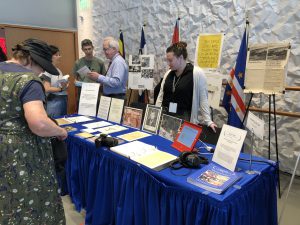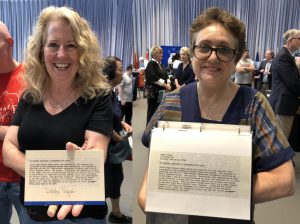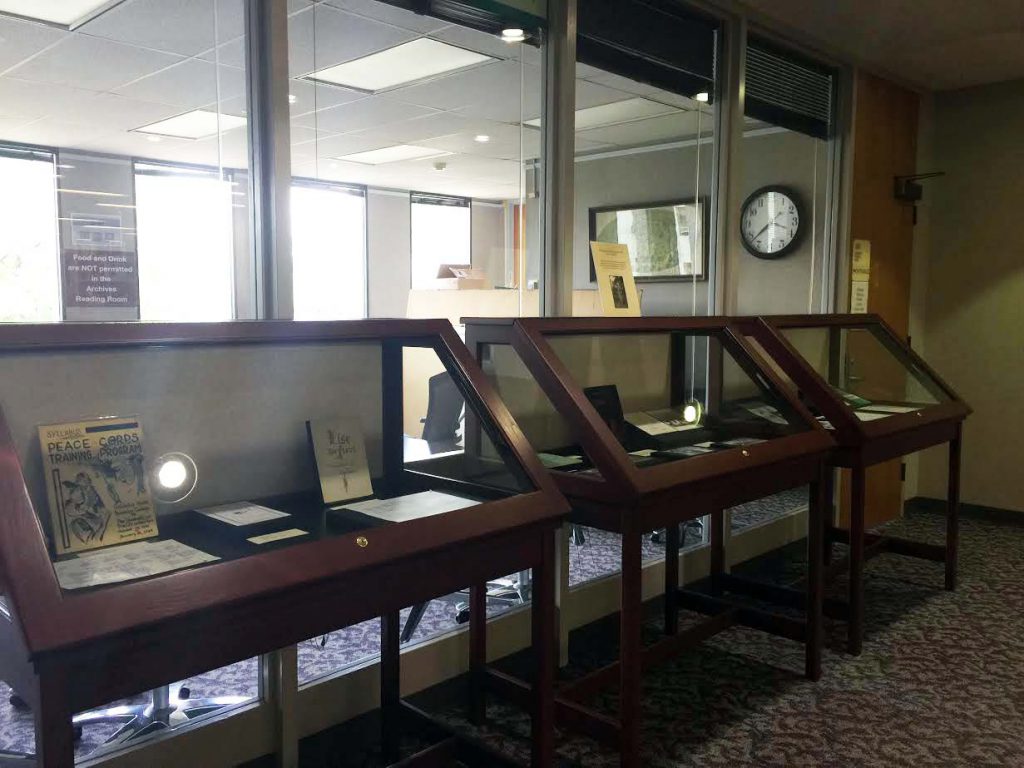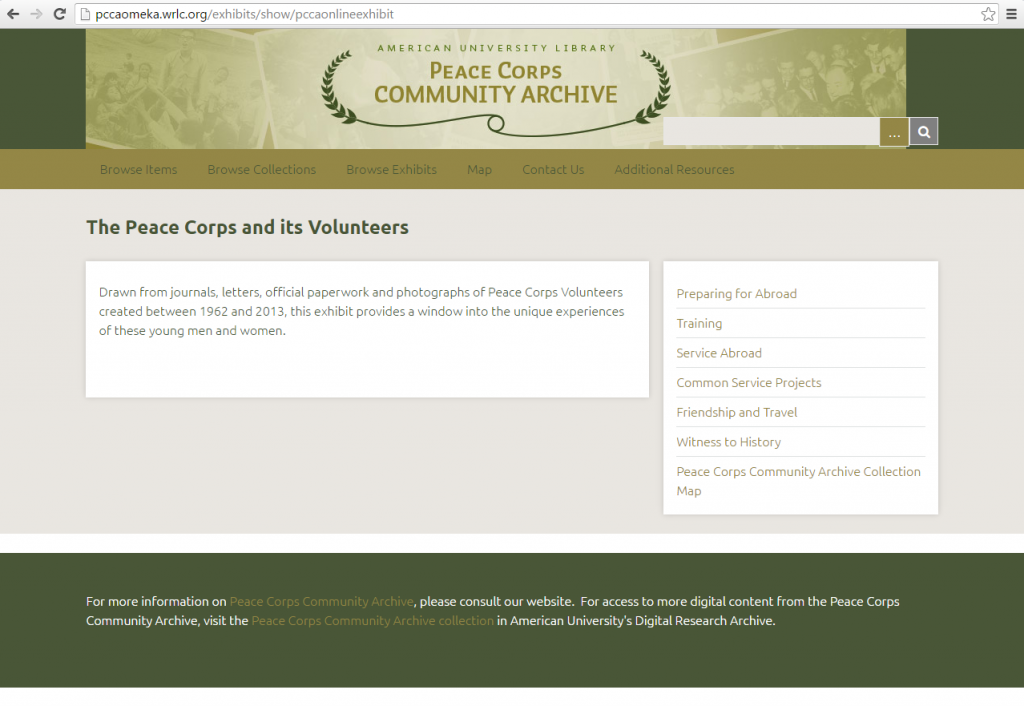Place of Service: Bungoma (St. Mary’s Kibabii Secondary School)
Service Type: Education
Dates in Service: 1964-1966
Keywords: Education, Youth
Accession Date: March 23, 2023
Access: No restrictions
Collection Size: 3 linear feet
Document Types
- Correspondence
- Photographs
- Reports
- Publications
- Film/Video
- Sound
Related Items in Other Repositories:
Oral History Interview [Kennedy Presidential Library]
Finding Aid:
- Box 1: Peace Corps Experience and Connections, c. 1964-2001
- Correspondence
- Peace Corps Correspondence, 1964
- Peace Corps Correspondence, 1965
- Peace Corps/Kenya/Kibabii Correspondence, 1966 undated, January-June 1966
- Peace Corps/Kenya/Kibabii Correspondence, July-December 1966
- Kenya/Kibabii Correspondence, 1967-1968
- Kenya/Kibabii Correspondence, 1970
- Kenya/Kibabii Correspondence, c. 1971-1972
- Kenya/Kibabii Correspondence, c. 1973-1979
- Kenya/Kibabii Correspondence, 1980-1987
- Kenya/Kibabii Correspondence, c. 1994-2001
- Peace Corps Journal, 1964-1966
- Training Materials and Information
- Peace Corps Training Papers, 1964
- Peace Corps Training Notebooks, 1964
- Peace Corps Kenya Information, 1964
- Mary’s Kibabii Secondary School Materials
- Kibabii Student Essays, 1965 (1 of 2)
- Kibabii Student Essays, 1965 (2 of 2)
- Kibabii Student Essays, 1966
- Kibabii School Student Papers on Local History, 1966
- Kibabii Chronicle, 1966
- Drama Society Script Drafts, c. 1966
- Kibabii Student Reunion, 1995
- Publications
- Scully’s Kenya-Related Publications, 1969-1979
- Scully’s Thesis, “The Elgon Bantu Before the Coming of the Europeans,” 1970
- Box 2: Scully and Kibabii Publications, 1970-1995
- Miscellaneous
- Congregation of Our Lady of the Sacred Heart Utrecht Yearbook, 1966-1967 [in Dutch]
- Ticket Books, 1966-1968
- Correspondence
- Later Trips to Kenya with Students, c. 1970-1993
- Fort Sites
- Bukusu- South Mateka Fort Sites [Lumboka], 1970
- Bukusu- Seritanga Area Fort Site, 1970
- Bukusu- Chwele Area Maps and Fort Sites, 1970,
- Bukusu- Sangalo Maps and Fort Sites, 1970
- Chetambe Hill Project, Bukusu, Kenya, c. 1970
- Notebooks
- Numbered Field Report Books,1970-1971
- Unnumbered Field Notebooks, 1970-1971
- Scully’s Kenya Student Trip Reports, 1974 (1 of 2)
- Scully’s Kenya Student Trip Reports, 1974 (2 of 2)
- Publications and Assignments
- Scully’s Kenya Student Trip Reports: Related Correspondence and Publications, c. 1974-1993
- Dean Cowen 1974 Student Trip Report, “The History of Kibabii,” 1974
- Bukusu Clan Papers and Related History, c. 1970
- Scully Bukusu Fort publication, 1975
- Maps
- Bukusu Maps, c. 1970 (1 of 2)
- Bukusu Maps, c. 1970 (2 of 2)
- Fort Sites
- Friends of Kenya and National Peace Corps Association Materials, c. 1989-2011
- Documents
- Friends of Kenya Board Notes and Emails, c. 1996-1997
- Box 3: Friends of Kenya Peace Corps Correspondence, c. 1995-2011
- Friends of Kenya Newsletters including “Moto Moto,” c. 1994-2002
- Friends of Kenya Notes/Meetings; undated, 1989-2000
- Friends of Kenya Correspondence and Miscellaneous; undated, 1992-2003 (1 of 2)
- Friends of Kenya Correspondence and Miscellaneous; undated, 1992-2003 (2 of 2)
- Friends of Kenya Correspondence and Miscellaneous; undated, 1995-2002 (centered around 2000) (1 of 2)
- Friends of Kenya Correspondence and Miscellaneous; undated, 1995-2002 (centered around 2000) (2 of 2)
- Kibabii-St. Mary’s School Meetings and President Daniel Arap Moi Meeting, c. 1995-1998
- Friends of Kenya Correspondence and Related Publications; undated, c. 2000-2003 (1 of 2)
- Friends of Kenya Correspondence and Related Publications; undated, c. 2000-2003 (2 of 2)
- Peace Corps/Teachers for East Africa Alumni Meeting/ The Carter Presidential Library, c. 1998-2009
- Miscellaneous Correspondence, Friends of Kenya, Kibabii, Kenya Programs and Contacts; undated, 1993-1999
- National Peace Corps Association (NPCA) Board Notes; undated, 1997-2003 (1 of 2)
- National Peace Corps Association (NPCA) Board Notes; undated, 1997-2003 (2 of 2)
- Peace Garden Program, 1999
- Friends of Kenya-Polio Kenya Program, undated, 1996-1999
- Friends of Kenya Miscellaneous Correspondence; undated, 1997-1998, 2000-2002 (1 of 2)
- Friends of Kenya Miscellaneous Correspondence; undated, 1997-1998, 2000-2002 (2 of 2)
- Friends of Kenya Directory, 1994
- Other
- Friends of Kenya- Marafiki Tee Shirt, undated
- Box 4: Friends of Kenya and Friends of Malawi Miscellaneous Tapes, 1994-1995
- Documents
- Photos, c. 1964-2000
- Peace Corps Kenya Photos, c. 1964-1969 (1 of 3)
- Peace Corps Kenya Photos, c. 1964-1969 (2 of 3)
- Peace Corps Kenya Photos, c. 1964-1969 (3 of 3)
- Chetambe Hill Project Photos, Bukusu, Kenya, c. 1970
- Miscellaneous Photos of Circumcision Ceremony, August 1966 (Content Warning)
- Miscellaneous Photos, c. 1964-2000
- Miscellaneous Negatives, c. 1964-2000













